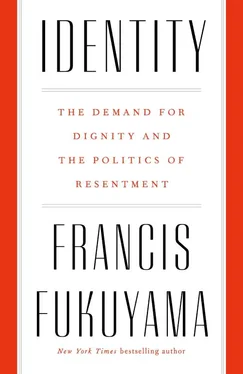But nationalism was also born out of the acute anxieties bred by industrialization. Consider the situation of a young peasant, Hans, who grows up in a small village in Saxony. Hans’s life in the little village is fixed: he is living in the same house as his parents and grandparents; he is engaged to a girl whom his parents found acceptable; he was baptized by the local priest; and he plans to continue working the same plot of land as his father. It doesn’t occur to Hans to ask “Who am I?” since that question has already been answered for him by the people around him. However, he hears that big opportunities are opening up in the rapidly industrializing Ruhr valley, so he travels to Düsseldorf to get a job in a steel factory there.
Hans is now living in a dormitory with hundreds of other young men like himself, coming from all over northwestern Germany. People speak in different dialects; some of the people he meets are not German at all, but Dutch or French. He is no longer under the thumb of his parents and local priest and finds people with different religious affiliations than those in his village. He is still committed to marrying his fiancée but tempted by some of the local women he has met, and he feels a bracing sense of freedom in his personal life.
At the same time Hans is troubled. Back in his village, he was surrounded by friends and relatives, who knew him and would support him in times of sickness or a bad harvest. He does not have that kind of certainty about the new friends and acquaintances he has made and is not sure that his new employer, a big corporation, will look after his interests. He is told that some Communist agitators are pushing to create a trade union in his factory, but he has heard bad things about them and doesn’t trust them either. The newspapers are full of conflicting stories about fights in the parliament, and he is not sure whom to believe. Hans suspects that all of these quarreling political parties are selfish and not interested in representing him. His part of Germany has become part of an enormous Reich of which he can feel proud, but one that is barreling forward to an uncertain future. He feels lonely and disconnected from his surroundings; he feels nostalgia for his village, but doesn’t want to return there, as that would be a sign of personal defeat. For the first time in his life, Hans can make choices about how to live his life, but he wonders who he really is and what he would like to be. The question of identity, which would never have been a problem back in his village, now becomes central.
Hans’s personal story was characterized by the nineteenth-century social theorist Ferdinand Tönnies as the shift from Gemeinschaft to Gesellschaft , or from (village) community to (urban) society. It was experienced by millions of Europeans during the nineteenth century and is now happening in rapidly industrializing societies such as China and Vietnam.
The psychological dislocation engendered by the transition from Gemeinschaft to Gesellschaft laid the basis for an ideology of nationalism based on an intense nostalgia for an imagined past of strong community in which the divisions and confusions of a pluralist modern society did not exist. Well before the rise of Adolf Hitler in the 1930s, German writers were lamenting the loss of Gemeinschaft and what they saw as the perversions of a cosmopolitan liberal society.
The historian Fritz Stern analyzed a number of these early ideologists of German identity, such as the hugely influential polemicist and biblical scholar Paul de Lagarde. Lagarde lived in Bismarck’s newly unified Germany of the late nineteenth century, when the country was experiencing an economic miracle of growth, industrialization, and burgeoning military and political power. Yet Lagarde, in countless articles and pamphlets (collected as his German Writings in 1886), saw around him nothing but cultural decay: the German spirit had declined into self-seeking as a result of liberal doctrines based on rationality and science. The old Germany was one of virtues and strong community that needed to be brought back. He imagined a new religion that would fuse Christianity with the “national characteristics of the Germans,” a faith that would become the basis for a new national identity. Lagarde wrote, “Once a nation, [a people] has but one will, and all conflict is banished.” Something of an academic outcast, he had never achieved the fame he thought he deserved for his interpretive work on the Septuagint; unity with the German people was at once a solution to his personal loneliness and a source of the dignity he could not achieve as an individual scholar. {5} 5 Fritz Stern, The Politics of Cultural Despair: A Study in the Rise of German Ideology (Berkeley: University of California Press, 1974), 19–20.
Lagarde, like Julius Langbehn, Arthur Moeller van den Bruck, and other nineteenth-century German nationalists, saw the German people as victims of outside forces. Lagarde had a conspiratorial view of why German culture had decayed: the Jews were the bearers of liberal modernity, inserting themselves into the cultural life of the new modern Germany, bringing with them universalist ideas of democracy and socialism that undermined the unity of the German people. To reestablish German greatness, the Jews would have to be banished from the new order he envisioned.
Intellectuals from Friedrich Nietzsche to Ernst Troeltsch to Thomas Mann read Lagarde sympathetically, and his works would be widely distributed by the Nazis. {6} 6 Ibid., 35–94 passim.
He spoke to the anxieties of people making the transition from agrarian village society to modern, urban industrial life, a transition that for millions of Europeans experiencing it pushed the question of identity to the forefront. This was the moment in which the personal became the political. The answer given to a confused peasant like Hans from ideologists such as Lagarde was simple: You are a proud German, heir to an ancient culture, connected by your common language to all of the millions of other Germans scattered across Central and Eastern Europe. The lonely and confused worker now had a clear sense of dignity, a dignity that, he now realized, was disrespected by bad people who had somehow infiltrated his society.
The new form of identity based on shared culture and language unleashed new passions, since these new cultural groups lived in old jurisdictions such as the Austro-Hungarian Empire that were based on dynastic ties rather than culture. Uniting scattered Germans under a single Reich would become a political project over the next three generations undertaken by leaders from Bismarck to Hitler. Other nationalities—Serbs, Poles, Hungarians, Russians—were also seeking to create or consolidate states based on ethno-nationalism, which would lead Europe into two devastating world wars in the early twentieth century.
Identity also became a critical issue in the then-colonial world. The parts of Asia, Africa, and Latin America dominated by the European powers were not as a whole industrializing as Europe was. They were instead going through what has sometimes been labeled modernization without development—that is, urbanization and rapid social change without sustained economic growth. They acquired new capital cities with a small indigenous elite that collaborated with the colonial powers in administering their territories. Members of this elite received European educations and spoke the metropolitan language. But they felt an intense inner conflict between these acquired identities and the indigenous traditions with which they had grown up. As nationalism spread in Europe, it took root as well in Europe’s colonies, leading by the middle of the twentieth century to open revolts in such places as India, Vietnam, Kenya, and Algeria in the name of national liberation. Nationalism in the colonial world led to efforts by intellectuals to revolutionize culture as well. Black writers such as Aimé Césaire, Léon Damas, and Léopold Senghor, for example, developed the concept of Négritude to help blacks take pride in their race and heritage, reversing the colonial regimes’ denigration of them.
Читать дальше












